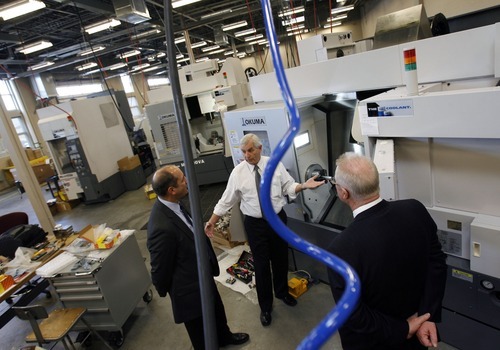This is an archived article that was published on sltrib.com in 2012, and information in the article may be outdated. It is provided only for personal research purposes and may not be reprinted.
After weeks of discussions, the Legislature's education budget committee plans to make recommendations Wednesday evening on how much cash to give schools.
They'll also likely discuss possible changes to state law that would affect school district coffers.
The meeting is at 5 p.m., in Room 445 at the State Capitol.
Sen. Howard Stephenson, R-Draper, told fellow committee members Monday that he'd like them to consider putting language in the forthcoming education budget bill that would gradually shift some of the cost of charter schools away from the state — a move that could mean less money for districts.
Now, the state pays charters more than $65 million a year in "local replacement" money because they cannot bond or levy taxes as school districts do. Stephenson, who co-chairs the committee, said he'd like to see lawmakers consider gradually phasing out that payment. Such a phase-out would likely mean shifting that cost to districts.
Stephenson said charter school students are now being double-funded because the state pays for them to attend charter schools but doesn't take money from districts when those students leave for charters. But it's sure to be a contentious issue as district officials have long argued they are already cash-strapped and can't afford to help pay for charters. Lawmakers have tried to pass similar measures in recent years with limited success.
Stephenson also said he'd like the committee to consider language to avoid double-funding students who take certain career and technical education classes. Last year, lawmakers decided that districts that send students to Utah College of Applied Technology (ATC) campuses for part of the school day shouldn't continue to get the full amount of funding for those students because they're not in district schools all day. That change means about $5 million less for districts.
Over the past year, however, rural districts have argued that without that money, they may have to make cuts in other areas, and they might find it difficult to keep sending kids to ATCs.
Stephenson said Monday he'd like the committee to not give that $5 million back to districts and to consider changing the law so districts would lose even more cash if they attempted to duplicate nearby ATC programs in their own schools in order to keep students and the funding that comes with them.
He said he doesn't want to give school districts an incentive to duplicate programs already offered by nearby ATCs.
The committee will likely discuss that issue as well as make a list of what should get priority funding Wednesday evening. The committee's recommendations will go to the Executive Appropriations Committee, which will make final recommendations for the Legislature.
Sen. Lyle Hillyard, co-chair of the Executive Appropriations Committee, urged committee members to arrive at Wednesday's meeting with ideas and compromises in mind in order to help produce a viable proposal.
He reminded them that public education officials aren't fond of 11th-hour changes to the education budget. Lawmakers often make major changes to the education budget in the last couple days of the session.
"Sometimes the amendments may sound good," Hillyard said of last minute changes, "but as they actually apply, may not work so well."
The House and Senate have already passed a base education budget bill, which was a starting point. But that base does not include money for new students and a number of school programs. The committee will attempt to fill out the rest of that budget with their recommendations.



